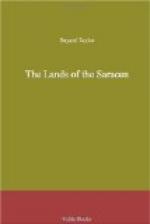The Anti-Lebanon now rose near us, its northern and western slopes green with trees and grass. The first range, perhaps 5,000 feet in height, shut out the snowy head of Hermon; but still the view was sublime in its large and harmonious outlines. Our road was through a country resembling Arcadia—the earth hidden by a dense bed of grass and flowers; thickets of blossoming shrubs; old, old oaks, with the most gnarled of trunks, the most picturesque of boughs, and the glossiest of green leaves; olive-trees of amazing antiquity; and, threading and enlivening all, the clear-cold floods of Lebanon. This was the true haunt of Pan, whose altars are now before me, graven on the marble crags of Hermon. Looking on those altars, and on the landscape, lovely as a Grecian dream, I forget that the lament has long been sung:
“Pan, Pan is dead!”
In another hour, we reached this place, the ancient Caesarea Philippi, now a poor village, embowered in magnificent trees, and washed by glorious waters. There are abundant remains of the old city: fragments of immense walls; broken granite columns; traces of pavements; great blocks of hewn stone; marble pedestals, and the like. In the rock at the foot of the mountain, there are several elegant niches, with Greek inscriptions, besides a large natural grotto. Below them, the water gushes up through the stones, in a hundred streams, forming a flood of considerable size. We have made our camp in an olive grove near the end of the village, beside an immense terebinth tree, which is inclosed in an open court, paved with stone. This is the town-hall of Banias, where the Shekh dispenses justice, and at the same time, the resort of all the idlers of the place. We went up among them, soon after our arrival, and were given seats of honor near the Shekh, who talked with me a long time about America. The people exhibit a very sensible curiosity, desiring to know the extent of our country, the number of inhabitants, the amount of taxation, the price of grain, and other solid information.
The Shekh and the men of the place inform us that the Druses are infesting the road to Damascus. This tribe is in rebellion in Djebel Hauaran, on account of the conscription, and some of them, it appears, have taken refuge in the fastnesses of Hermon, where they are beginning to plunder travellers. While I was talking with the Shekh, a Druse came down from the mountains, and sat for half an hour among the villagers, under the terebinth, and we have just heard that he has gone back the way he came. This fact has given us some anxiety, as he may have been a spy sent down to gather news and, if so, we are almost certain to be waylaid. If we were well armed, we should not fear a dozen, but all our weapons consist of a sword and four pistols. After consulting together, we decided to apply to the Shekh for two armed men, to accompany us. I accordingly went to him again, and exhibited the firman of the Pasha of Jerusalem, which he read, stating that, even without it, he would have felt it his duty to grant our request. This is the graceful way in which the Orientals submit to a peremptory order. He thinks that one man will be sufficient, as we shall probably not meet with any large party.




